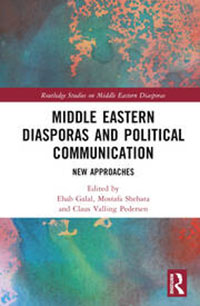Digital diaspora: The case of Farkhunda and Afghan women's resistance
 Associate Professor Karen Waltorp and have contributed the chapter ‘Digital diaspora: The case of Farkhunda and Afghan women's resistance’ to the book Middle Eastern Diasporas and Political Communication: New Approaches, edited by Ehab Galal, Mostafa Shehata, and Claus Valling Pedersen.
Associate Professor Karen Waltorp and have contributed the chapter ‘Digital diaspora: The case of Farkhunda and Afghan women's resistance’ to the book Middle Eastern Diasporas and Political Communication: New Approaches, edited by Ehab Galal, Mostafa Shehata, and Claus Valling Pedersen.
This edited book explores the development and reconfiguration of Middle Eastern diasporic communities in the West in the context of increased political turmoil, civil war, new authoritarianism, and severe constraints on media in the Middle East.
In their chapter, Waltorp and Ben Haddou discuss communication that is political in nature among members of the Afghan diaspora in Denmark, and what social media platforms afford in terms of this communication and its implications. Combining fieldwork, interviews across generations and an (auto)ethnographic approach on the one hand, with aggregated twitter data across larger numbers and across countries on the other, they bring together the experiential scale and big data on political communication around this specific case, focusing on how gender politics is invoked by various stakeholders and for various ends across Afghanistan and in diaspora.
Waltorp and Ben Haddou start from a specific event: the killing of the woman Farkhunda Malikzada, falsely accused of having burned the Qur’an in Kabul in 2015. Both old and new media figure in this horrific case. Videos of the event were filmed on smartphones and shared on the internet, journalistic coverage appeared in traditional media outlets, and civil society protests were mobilized in large part through social media. As the case went viral, images and hashtags circulated in social media, while demonstrations and vigils happened on the ground across the Afghan diaspora in the three largest Danish cities and across the world’s Afghan diaspora. Tangible political outcomes in terms of new legislation and implementation of policies around women’s rights in Afghanistan did not ensue. The platform of social media, however, has only become more important for Afghans in diaspora and in Afghanistan fighting for women’s rights and position in society. The Taliban takeover in August 2021 augmented this further.
Read more about the book on the Taylor & Francis Group's website: Middle Eastern Diasporas and Political Communication: New Approaches
